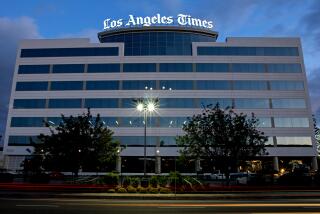Column on Smart & Final Ignored Company’s Side
- Share via
When I read Harry Bernstein’s labor column of Aug. 1, “Many Americans Share Miners’ Problem,” I was dismayed to find that untruths, half-truths and innuendoes had been so freely used to attack Smart & Final Iris Corp. and falsely portray the facts and circumstances of its current labor situation.
Bernstein never requested comment from either myself or, to my knowledge, any other Smart & Final representative. Had he done so, he would have been provided the following information contradicting the “facts” presented:
First, Smart & Final never “refused to continue paying health-care premiums for retirees.” Health care was provided to retirees under the terms and conditions of the Teamster/Employer Health and Welfare Trust. Smart & Final only contributed on behalf of active employees.
Last February, when negotiations broke down and Smart & Final implemented its final offer, the trust advised us that they could no longer accept contributions for active employees and had unilaterally elected to terminate coverage for retired employees. We felt this decision was in direct violation of the terms and conditions of the trust and proceeded to file suit in federal court on behalf of all retirees in order to compel continued coverage.
In June, when it became clear to me that the lawsuit would not be quickly resolved, I informed all retirees by letter that Smart & Final would assume responsibility for all medical coverage until the lawsuit was resolved. I realize that the image of retired persons being denied medical care makes for sympathetic prose, but it is clearly a far distance from the truth in this instance.
Second, Bernstein makes reference to Smart & Final leaving certain “employer associations” to gain competitive advantage over its “industry rivals.” Smart & Final did belong to the Food Employers Council, or FEC, a group of retail supermarket operators, when it owned the Thriftimart operation. When Thriftimart closed, the reason for belonging to the FEC ceased to exist.
Smart & Final is clearly a different operation with different needs than a retail supermarket chain. We sell products in large quantities to business customers, have no butchers or retail clerks and use different methods of distribution. As a result, we resigned from the FEC in 1984 and did not participate in the FEC negotiations last October or in the previous round of negotiations in 1985. It is difficult to gain a competitive advantage against “rivals” with whom we do not compete.
Finally, Bernstein accuses Smart & Final of “reducing the wages and benefits of active workers.” He fails to mention that the wage offer that Smart & Final did implement in February of this year actually pays more per hour to its employees than the “industry” contract. He also neglects to mention that when that offer was extended to Smart & Final employees, over two-thirds of them left the picket lines and returned to work. Further, that offer did not “reduce” anything. In fact, Smart & Final has gone out of its way to provide the same (or in some cases better) benefits than the previous contract.
Given the ready availability of the facts in this case, I must conclude that it was Bernstein’s intent to serve Teamster interests without regard to the truth.
ROGER M. LAVERTY III
Los Angeles
The writer is president of Smart & Final Iris Corp.
More to Read
Inside the business of entertainment
The Wide Shot brings you news, analysis and insights on everything from streaming wars to production — and what it all means for the future.
You may occasionally receive promotional content from the Los Angeles Times.










